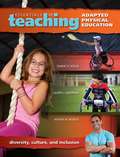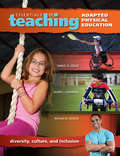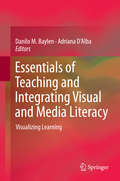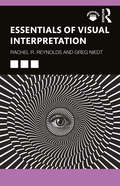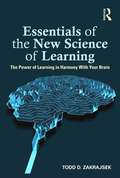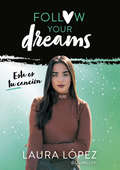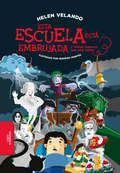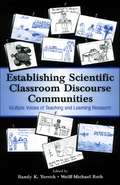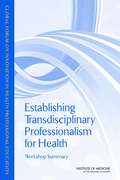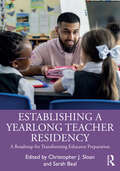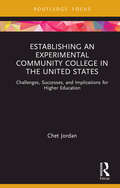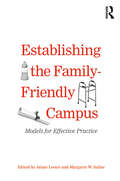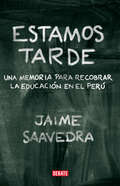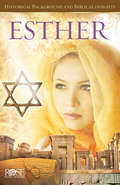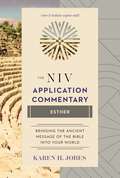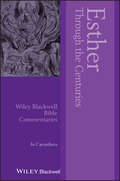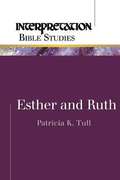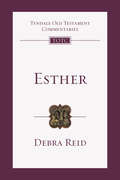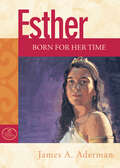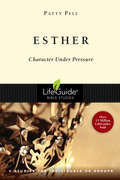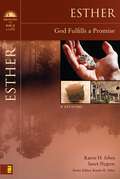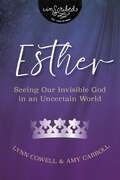- Table View
- List View
Essentials of Teaching Adapted Physical Education: Diversity, Culture, and Inclusion
by Lauren J. Lieberman Samuel R. Hodge Nathan M. MurataEssentials of Teaching Adapted Physical Education: Diversity, Culture, and Inclusion offers a wealth of knowledge for teaching today's diverse student population, including those with disabilities. Readers will learn how to teach a variety of students, organize learning within various curricular models, assess and evaluate students, and manage behavior. Readers will also learn more about the conditions and disabilities they may encounter when teaching, how to understand students' various abilities, and how to adapt and modify instructional methods to include all students. The book emphasizes the importance of being culturally responsive and acquiring the necessary knowledge to infuse appropriate, socially just practices into educational settings. Future teachers will learn how to apply culturally responsive instructional methods and behavior management strategies and will understand broader social and economic contexts for their students' behavior. At the same time, this book provides more than a how-to approach to teaching adapted physical education. Its content and features promote reflective learning, encouraging readers to anticipate the types of teaching situations and challenges that may arise and think through how they will respond. Scenarios and vignettes throughout provide context for the material and promote critical thinking and problem solving.
Essentials of Teaching Adapted Physical Education: Diversity, Culture, and Inclusion
by Lauren Lieberman Nathan Murata Samuel HodgeEssentials of Teaching Adapted Physical Education: Diversity, Culture, and Inclusion offers a wealth of knowledge for teaching today's diverse student population, including those with disabilities. Readers will learn how to teach a variety of students, organize learning within various curricular models, assess and evaluate students, and manage behavior. Readers will also learn more about the conditions and disabilities they may encounter when teaching, how to understand students' various abilities, and how to adapt and modify instructional methods to include all students.The book emphasizes the importance of being culturally responsive and acquiring the necessary knowledge to infuse appropriate, socially just practices into educational settings. Future teachers will learn how to apply culturally responsive instructional methods and behavior management strategies and will understand broader social and economic contexts for their students' behavior.At the same time, this book provides more than a how-to approach to teaching adapted physical education. Its content and features promote reflective learning, encouraging readers to anticipate the types of teaching situations and challenges that may arise and think through how they will respond. Scenarios and vignettes throughout provide context for the material and promote critical thinking and problem solving.
Essentials of Teaching and Integrating Visual and Media Literacy
by Danilo M. Baylen Adriana D'AlbaThis book focuses on how to effectively integrate the teaching and learning of visual and media literacies in K-12 and higher education. Not only does it address and review the elements and principles of visual design but also identifies, discusses and describes the value of media in learning diverse and challenging content across disciplines. Finally, this book provides a balanced treatment of how visual and media literacies support deep content learning, student engagement, critical thinking, creativity, problem solving, and production.
Essentials of Visual Interpretation
by Greg Niedt Rachel R ReynoldsEssentials of Visual Interpretation explains how to talk and write critically about visual media and to examine how evolving visual environments, media, and technologies affect human selfunderstanding and culture formation.Lively and accessibly written chapters provide a solid foundation in the tools and ideas of visual meaning, familiarizing readers with a growing, cross-cultural subfield, and preparing them to pursue thoughtful work in a variety of related disciplines. The authors include rich examples and illustrations—ranging from cave paintings to memes, from optical science to visual analytics, from ancient pictographs to smart phones—that engage students with the fascinating complexity of visual interpretation. Each chapter introduces students to key terms and concepts relevant to visual analysis, with ideas for short individual or group exercises to enhance understanding.The book is ideal as a primer in visual analysis and visual communication for students in courses within communication studies, cultural studies, digital humanities, semiotics, media studies, and visual anthropology.Online support materials include multimedia activities for students and links to additional resources for students and instructors.
Essentials of the New Science of Learning: The Power of Learning in Harmony With Your Brain
by Todd D. ZakrajsekThis streamlined adaption of the best-selling book The New Science of Learning: How to Learn in Harmony with Your Brain is a distillation of the most essential and immediately effective tips and strategies selected specifically to put college students on the path to success.In this primer, Zakrajsek masterfully translates complex findings from cognitive psychology and neuroscience into easy-to-understand concepts that can be used immediately to learn faster and retain information longer. Readers will come away with strategies that have been demonstrated throughout the world to improve learning, as well as a greatly enhanced understanding of how the learning process works. Taking just a few hours to read the material in this book and practice what has been assembled for learners at any level may well prove to be one of the best decisions a college student can make.Essentials of the New Science of Learning: The Power of Learning in Harmony With Your Brain is ideal for individual student use or as a powerful supplement to any course, in any course, across the college curriculum.
Esta es tu canción (Follow your dreams #Volumen 2)
by Laura López¡Vuelve la estrella de Musical.ly, con más música, más baile y más aventuras! ¡The Rocks se va de gira por Europa! ¡Y necesitan bailarines! Está claro que Laura y sus amigos están más que dispuestos a sumarse a esta nueva aventura a su lado. Además, tiene alguna que otra razón personal para querer ver a The Rocks... Laura López, más conocida como @laura_lp21, es una de las personas con más seguidores de Musical.ly. Sus redes sociales suman nuevos seguidores cada día y desde ahí comparte con todos ellos sus videos y sus fotos. De pequeña, Laura ya destacaba por su carisma y complicidad con la cámara, y quizá por eso sus videos tienen ese atractivo especial que emociona.
Esta escuela está embrujada: y otros cuentos que dan miedo
by Helen VelandoCuentos fantásticos, llenos de magia y fantasía, que ocurren en diferentes escuelas y colegios. A veces las historias más extrañas suceden a la vuelta de la esquina; las escuelas y colegios pueden ser lugares llenos de magia y diversión. En este libro se cuentan historias de escobas voladoras, de pócimas de amor, de un piano que desparrama música encantada en medio del campo y hasta se dan recetas para una tormenta. También aparecen personajes como el profesor Gulember, el gran mago de las dudas, Brunilda, la bruja de cuarto, y Relámpago, el perro que no ladraba.
Establishing Academic Freedom
by Timothy Reese CainThe is this the book-length work addressing the development of academic freedom and the procedures designed to protect it from the 1915 founding of the AAUP and the AAC to their endorsement of the key document in the history of professorial rights and responsibilities, the 1940 Statement of Principles of Academic Freedom and Tenure.
Establishing Family-School Partnerships in School Psychology: Critical Skills (Foundations of School Psychology Research and Practice)
by S. Andrew GarbaczEstablishing Family-School Partnerships in School Psychology provides actionable, evidence-based practices toward effective family-school partnerships. Offering scoped and sequenced approaches to embed family-school partnership interventions within a three-tier prevention framework, the book covers mental health screening, cultural responsiveness, technology use, and more. This volume in the Foundations of School Psychology Research and Practice Series makes clear how sustained implementation of family-school partnerships can be achieved within existing educational infrastructures to promote student achievement across developmental periods and schooling levels.
Establishing Pathways to Inclusion: Investigating the Experiences and Outcomes for Students with Special Educational Needs
by Richard Rose Michael ShevlinProviding a robust understanding of what really works for educators and pupils alike, this book shows how inclusive practices function effectively in schools. Rose and Shevlin identify key factors which can influence successful inclusive practice and examine how schools can establish and implement an agenda for change. Using a framework for analysing and understanding how students become effective social learners, this book guides readers through sections on context, observed experiences, and the factors for success they highlight, covering topics such as: The respective attitudes of students, caregivers and teachers Insights from support staff and school leaders The social and academic outcomes for pupils with special educational needs Lessons learned from inclusive practices Ideal for researchers, lecturers, and advanced students in the field of inclusive education, Establishing Pathways to Inclusion is an important contribution from leading researchers in this vital field of study.
Establishing Scientific Classroom Discourse Communities: Multiple Voices of Teaching and Learning Research
by Wolff-Michael Roth Randy YerrickEstablishing Scientific Classroom Discourse Communities: Multiple Voices of Teaching and Learning Research is designed to encourage discussion of issues surrounding the reform of classroom science discourse among teachers, teacher educators, and researchers. The contributors--some of the top educational researchers, linguists, and science educators in the world--represent a variety of perspectives pertaining to teaching, assessment, research, learning, and reform. As a whole the book explores the variety, complexity, and interconnectivity of issues associated with changing classroom learning communities and transforming science classroom discourse to be more representative of the discourse of scientific communities. The intent is to expand debate among educators regarding what constitutes exemplary scientific speaking, thinking, and acting. This book is unparalleled in discussing current reform issues from sociolinguistic and sociocultural perspectives. The need for a revised perspective on enduring science teaching and learning issues is established and a theoretical framework and methodology for interpreting the critique of classroom and science discourses is presented. To model and scaffold this ongoing debate, each chapter is followed by a "metalogue" in which the chapter authors and volume editors critique the issues traversed in the chapter by opening up the neatly argued issues. These "metalogues" challenge, extend, and deepen the arguments made. Central questions addressed include: *Why is a sociolinguistic interpretation essential in examining science education reform? *What are key similarities and differences between classroom and scientific communities? *How can the utility of common knowledge and existing classroom discourse be balanced toward alternative outcomes? *What curricular issues are associated with transforming classroom talk? *What other perspectives can assist in creating multiple access to science through redefining classroom discourse? Whether this volume improves readers' science teaching, assists their research, or helps them to better prepare tomorrow's science teachers, the goal is to engage them in considering the challenges faced by educators as they navigate the seas of reform and strive to improve science education for all.
Establishing Transdisciplinary Professionalism for Improving Health Outcomes
by Patricia A. Cuff"Establishing Transdisciplinary Professionalism for Improving Health Outcomes" is a summary of a workshop convened by the Institute of Medicine Global Forum on Innovation in Health Professional Education to explore the possibility of whether different professions can come together and whether a dialogue with society on professionalism is possible. Most of the 59 members making up the Global Forum were present at the workshop and engaged with outside participants in active dialogue around issues related to professionalism and how the different professions might work effectively together and with society in creating a social contract. The structure of the workshop involved large plenary discussions, facilitated table conversations, and small-group breakout sessions. In this way, the members - representing multiple sectors, countries, health professions, and educational associations - had numerous opportunities to share their own perspectives on transdisciplinary professionalism as well as hear the opinions of subject matter experts and the general public. Efforts to improve patient care and population health are traditional tenets of all the health professions, as is a focus on professionalism. But in a time of rapidly changing environments and evolving technologies, health professionals and those who train them are being challenged to work beyond their traditional comfort zones, often in teams. A new professionalism might be a mechanism for achieving improved health outcomes by applying a transdisciplinary professionalism throughout health care and wellness that emphasizes crossdisciplinary responsibilities and accountability. "Establishing Transdisciplinary Professionalism for Improving Health Outcomes" discusses how shared understanding can be integrated into education and practice, ethical implications of and barriers to transdisciplinary professionalism, and the impact of an evolving professional context on patients, students, and others working within the health care system.
Establishing a Yearlong Teacher Residency: A Roadmap for Transforming Educator Preparation
by Christopher J. Sloan Sarah BealThis book outlines a model for a teacher residency and how to establish a yearlong residency within an educator preparation program. It describes the four-year experiences of stakeholders at Tarleton State University but can be used as a step-by-step guide, in whole or in part, to transforming teacher preparation at any university. After a brief description of the “traditional” clinical model and why a university may look to make a change, the book offers a roadmap for the entire process of moving to a residency model. The chapters provide detailed explanations of how to build mutually beneficial partnerships with school districts, utilize co-teaching models, and create revised roles for cooperating teachers, teacher-residents, university and district leaders, and site coordinators. Contributing authors also cover change processes (successes and failures), funding models, scaling, sustainability, data collection, and evidence of effectiveness. Based on Tarleton’s recognition as one of the fastest-scaling residency programs and most complete transformations to date, the tools presented offer any teacher prep program the opportunity to make the leap to a residency model. This resource is also ideal for school district leaders seeking guidance on building or enhancing existing partnerships with universities, and for in-service teachers interested in discovering new co-teaching models.
Establishing an Experimental Community College in the United States: Challenges, Successes, and Implications for Higher Education (Routledge Research in Higher Education)
by Chet JordanThis text offers an in-depth case study of the development of an experimental community college established by City University of New York with the aim of increasing two-year completion rates. By detailing academic and administrative reforms undertaken at Guttman Community College since 2007, the text illustrates the implementation of innovative practices in developmental education, advising, and experiential education and offers critical commentary on why reforms failed to bring the expected results. In a series of comprehensive and insightful chapters, Jordan maps the process of implementation and reform at Guttman Community College. In doing so, he explores the shortcomings of the Guttman enterprise, and offers in-depth analysis of the causes and implications of a failure to account for the local context and student population in planning and implementation phases. This unique, historical narrative thus offers important insights into pitfalls and best practices around issues of racial inequity, governance and leadership, curriculum development, student support services, and data-driven decision making. Each chapter concludes with a section focusing specifically on implications for the post-secondary system more broadly to inform effective, appropriate, and inclusive college reform. This book will be of interest to postgraduates and researchers exploring the history and governance of postsecondary education in the United States, as well as academic administrators, faculty, and policymakers. Jordan speaks to the myriad lessons that can be valuable for a higher education landscape that is hungry for innovation and reform.
Establishing the Family-Friendly Campus: Models for Effective Practice
by Jaime Lester Margaret SalleeThe impact of changing demographics in higher education, and the importance of family-friendly policies, is well documented. There is an urgent need to keep PhDs in the higher education sector, to recruit talented scholars into academia, and retain them over the course of their academic careers. The key is instituting policies to enable all constituencies to balance work and personal responsibilities.This book covers the range of issues faced by all generations in academe, from PhD students, to the “sandwich generation” (those caring for children and aging parents simultaneously) through to older faculty and administrators. It addresses the causes for women faculty with children leaving the academy at a disproportionately higher rate than men, the conflicts women face between academic work and motherhood, and the difficulties they encounter in reentering the academy after having left the professoriate. In examining the need for family-friendly policies, this book documents the “best practices” currently in use at institutions across the United States. Each chapter highlights practices and programs from a variety of institutions and institutional types that address the needs of a more inclusive family-friendly campus and offers suggestions to others who are implementing similar change on their campuses. These examples provide context so that readers no longer have to develop practices in isolation, and without evidence of their effectiveness.The editors suggest that the most successful campuses are those that utilize a work-life systems framework to meet the needs of its employees. They also point to future growth trends, including expanding the focus from faculty and staff to incorporate all in the campus communityThis book offers guidance to department chairs, deans, faculty, administrators, and graduate students on setting a family-friendly agenda, and models for implementation.Contributors include: Emily Arms -- Kathleen Beauchesne -- Jill Bickett -- Sharon A. Dannels -- Mariko Dawson Zare -- Karie Frasch -- Marc Goulden -- Jeni Hart -- Caryn Jung -- Jaime Lester -- Sharon A. McDade -- Jean McLaughlin -- Mary Ann Mason -- Sharon Page-Medrich -- Kate Quinn -- Margaret Sallee -- Randi Shapiro -- Angelica Stacy -- David L. Swihart -- Gloria D. Thomas -- Darci Thompson
Estamos tarde: Una memoria para recobrar la educación en el Perú
by Jaime SaavedraJaime Saavedra, exministro de Educación del Perú, nos narra las luchas y desafíos para reformar el sistema educativo en favor los estudiantes. ¿De qué magnitud es el reto de recomponer la Educación en el Perú? ¿Cuán importante es contar con gente comprometida en la función pública? ¿Es posible revertir la situación crítica de los sectores educativos? Mediante anécdotas personales y profesionales, ideas, estudios y datos que refuerzan sus planteamientos, el exministro de Educación, Jaime Saavedra, aborda en este libro algunos de los complejos retos educativos en el Perú, a partir de su experiencia entre los años 2013 y 2016. En esta cruzada urgente por recomponer la labor educativa, una sana obsesión surge y anima estas páginas: la de conformar ciudadanos que contribuyan al desarrollo nacional a partir de un compromiso político con la educación, que a la vez se traduzca en el aprendizaje y formación de las niñas, niños y jóvenes peruanos.Estamos tarde es un testimonio invaluable, pero también un intento de poner la educación nuevamente en el centro de la discusión pública, de insistir en la necesidad de obsesionarnos por ella y de asumir una decisión firme: que todas las acciones de política educativa respondan única y exclusivamente al bienestar de los estudiantes, que no es otro que el bienestar de todo un país. El tiempo apremia y el desafío es tan impostergable como colectivo.
Esther
by Rose PublishingThe Queen Esther Pamphlet is an excellent overview of the story of Queen Esther in the Bible. Esther's story asks the important question: Where is God when things go wrong? It's easy to characterize Queen Esther as the lucky orphan girl who won the heart of the king. But in reality, she was a young woman with a tragic background and dangerous secret that could cost her life and the lives of her family. She was married to King Ahasuerus (King Xerxes) who destroyed peoples' lives on a whim and had a history of killing people close to him. Worse still, the king's favorite counselor and chief advisor, Haman, was a mortal enemy of Esther and Mordecai's family. Esther had to keep a low profile, keeping her secret, and hoping her enemy wouldn't make the connection. For Esther, life was unfair. But her story brings a message of hope to all who face trouble by showing how God works even through the fears and dangers. There can be happy endings in perilous times! This basic overview of Esther and the biblical and cultural insights is fantastic for a Queen Esther Bible study, Sunday school class, or small group discussion. 14 panels, fits inside most Bibles, 8.5 x 5.5 inches, unfolds to 38 inches long.Queen Esther Gives Insights into the Life of EstherDetails about Queen Esther's Life *Summary of Esther's story: Her danger and her courage *Background on the biblical feast of Purim *Explanation of why the Jewish people were in Persia *Orphaned, raised by Mordecai.Details about Life in Ancient Persia 2500 Years Ago *Map of Persia and the entire Middle East at the Time of King Xerxes *Timeline of Key Events in Israel, Persia, Greece and Egypt During Esther's Lifetime *Intrigue in the Persian Court *Customs in Ancient Persia Details about The Cast of Characters in the Life of Esther *Spiritual parallels between the two banquets: The King's and Esther's *Hebrew/Persian meanings of Esther's name, as well as other key characters *Genealogy and Background of Each Key Character in the Story Esther is an outstanding close-up on one of the most fascinating stories in the Bible. You will find this pamphlet a great resource as you study the book of Esther and you are sure to refer to it often.
Esther (The NIV Application Commentary)
by Karen H. JobesThe NIV Application Commentary helps you communicate and apply biblical text effectively in today's context.This commentary shows how Esther is perfect guidance for us when we find ourselves in a situation where right and wrong are not so clearly defined and every choice we have seems to be a troubling mixture of good and bad. Esther is perfect inspiration for us when we find ourselves in situations we never sought, never planned for, and don&’t think we have the gifts to succeed at. To bring the ancient messages of the Bible into today's context, each passage is treated in three sections:Original Meaning. Concise exegesis to help readers understand the original meaning of the biblical text in its historical, literary, and cultural context.Bridging Contexts. A bridge between the world of the Bible and the world of today, built by discerning what is timeless in the timely pages of the Bible.Contemporary Significance. This section identifies comparable situations to those faced in the Bible and explores relevant application of the biblical messages. The author alerts the readers of problems they may encounter when seeking to apply the passage and helps them think through the issues involved.This unique, award-winning commentary is the ideal resource for today's preachers, teachers, and serious students of the Bible, giving them the tools, ideas, and insights they need to communicate God's Word with the same powerful impact it had when it was first written.
Esther Through the Centuries (Wiley Blackwell Bible Commentaries)
by Jo CarruthersThis interdisciplinary commentary ranges from early midrashic interpretation to contemporary rewritings introducing interpretations of the only biblical book not to mention God. Unearths a wealth of neglected rewritings inspired by the story’s relevance to themes of nationhood, rebellion, providence, revenge, female heroism, Jewish identity, exile, genocide and ‘multiculturalism’ Reveals the various struggles and strategies used by religious commentators to make sense of this only biblical book that does not mention God Asks why Esther is underestimated by contemporary feminist scholars despite a long history of subversive rewritings Compares the most influential Jewish and Christian interpretations and interpreters Includes an introduction to the book’s myriad representations in literature, music, and art Published in the reception-history series, Blackwell Bible Commentaries
Esther and Ruth
by Patricia K. TullIn classic Interpretation Bible Studies style, Patricia Tull leads the reader through a ten-session study of the entire Old Testament books of Esther, with its stories of faithfulness, courage, and survival, and the ethical questions posed by its ending, and Ruth, with its themes of community, loyalty, and friendship. Interpretation Bible Studies (IBS) offers solid biblical content in a creative study format. Forged in the tradition of the celebrated Interpretation commentary series, IBS makes the same depth of biblical insight available in a dynamic, flexible, and user-friendly resource. Designed for adults and older youth, Interpretation Bible Studies can be used in small groups, in church school classes, in large group presentations, or in personal study.
Esther: An Introduction And Commentary (Tyndale Old Testament Commentaries #Volume 13)
by Debra ReidThe place: Persia. The time: fifth-century BC. The Jews were threatened with genocide. A decree ordered the extermination of young and old, women and children. The book of Esther describes how this crisis was averted through the bravery of Esther, the wisdom of Mordecai and the unity of the Jewish people. Debra Reid's approachable commentary helps us see even more clearly in the book of Esther the God who quietly --and sometimes unexpectedly-- works behind the scenes to order the events of our lives. This completely new volume replaces the previous editon of Esther in the Tyndale Commentary series written by Joyce Baldwin.
Esther: Born for Her Time (God's People)
by James A AdermanWho was Esther?On its surface, the account of Esther in the Bible is a narrative about a beautiful woman’s rise to influence one of history’s most powerful rulers—King Xerxes of the Persian Empire.But at its heart, the story is about God’s impeccable timing, his redemptive power, and how God shapes historical events to conform his promises and grace. In using Esther, God was able to save his people from genocide and preserve his promise for the future.Esther was born for her time. In this book, you’ll see how that’s true for you as well. You’ll see how God keeps his age-old commitment to his people: “‘I know the plans I have for you,’ declares the Lord, ‘plans to prosper you and not to harm you, plans to give you hope and a future’” (Jeremiah 29:11).If you’re wondering who Esther was, or want to know how Esther’s faith journey impacts your own, this book is for you!Esther is part of the God’s People series by Northwestern Publishing House. It’s a wonderful collection about the lives and times of some of God’s chosen people. Plots and settings have been taken directly from the Bible, and each book features beautifully detailed, full-color illustrations.
Esther: Character Under Pressure (LifeGuide Bible Studies)
by Patty Pell"Who are you when no one's looking?" When her people were threatened, Esther had to ask herself that question. She could risk her life to try to save her fellow Israelites. Or she could "keep her head down" to wait out the threat in obscurity and safety. In this nine-sessions LifeGuide Bible Study for individuals or groups, Patty Pell leads you to examine the story of Esther. You'll discover how godly character often develops under pressure. And you'll discover ideas for living a godly life in the midst of contemporary pressures. This revised LifeGuide Bible Study features additional questions for starting group discussions and for meeting God in personal reflection, together with expanded leader's notes and a "Now or Later" section in each study. For over three decades LifeGuide Bible Studies have provided solid biblical content and raised thought-provoking questions—making for a one-of-a-kind Bible study experience for individuals and groups. This series has more than 130 titles on Old and New Testament books, character studies, and topical studies. PDF download with a single-user license; available from InterVarsity Press and other resellers.
Esther: God Fulfills a Promise (Bringing the Bible to Life)
by Karen H. Jobes Janet NygrenA series of Bible study guides following the format and content of the NIV Application Commentaries Series. Each study looks at the original meaning, bridging contexts, and contemporary significance of the text, and offers small group participants a better understanding and relevant application of the biblical material to their daily lives.
Esther: Seeing Our Invisible God in an Uncertain World (InScribed Collection)
by Lynn Cowell Amy CarrollWhat do you do when God seems to have vanished?When you have a decision to make, when your stability is shaken, when your sure-fire plan fails—when everything is spinning out of control…Esther is the perfect partner for seeing our invisible God in uncertainty. Though she lived centuries ago, Esther speaks to us when we run into limited control and resources. We find in her a strength and fortitude you and I need today. A strength we discover as we follow her process of listen, feel, do, and speak. We&’ll see that Esther carved a pathway, not only with faith but with influence, for all women who find themselves walking through uncertainty. This six-week, in-depth study of the book of Esther is a gritty dive into a woman&’s story that teaches us to:Listen to wise people who fill our gaps of understandingEmbrace your feelings as a catalyst for God-directed action.Do the work God assigns you even when in doubt.Speak up with confidence, knowing that God has a place for your voice in His story.This study guide includes biblical and historical background insights, Bible study, practical application, and questions for reflection.InScribed is a collection of studies that lead women to not just survive but thrive by encouraging them to immerse themselves in the Word of God.
